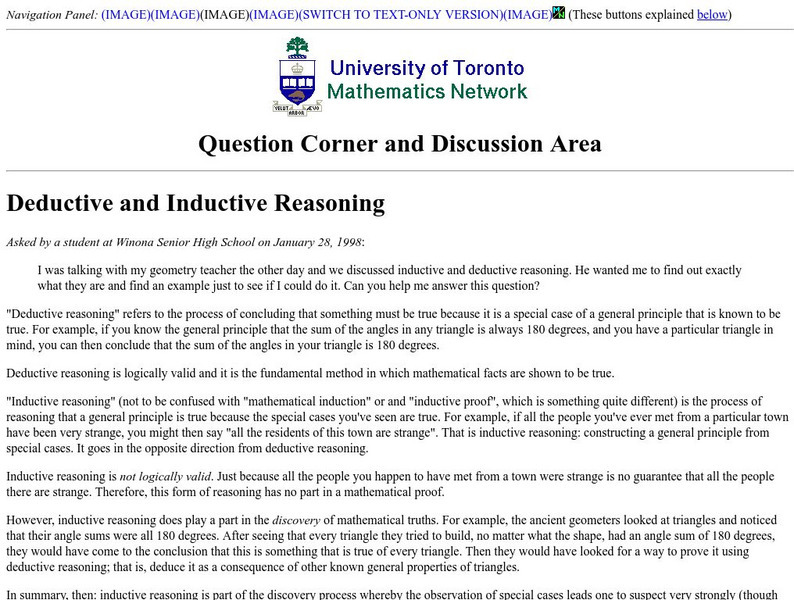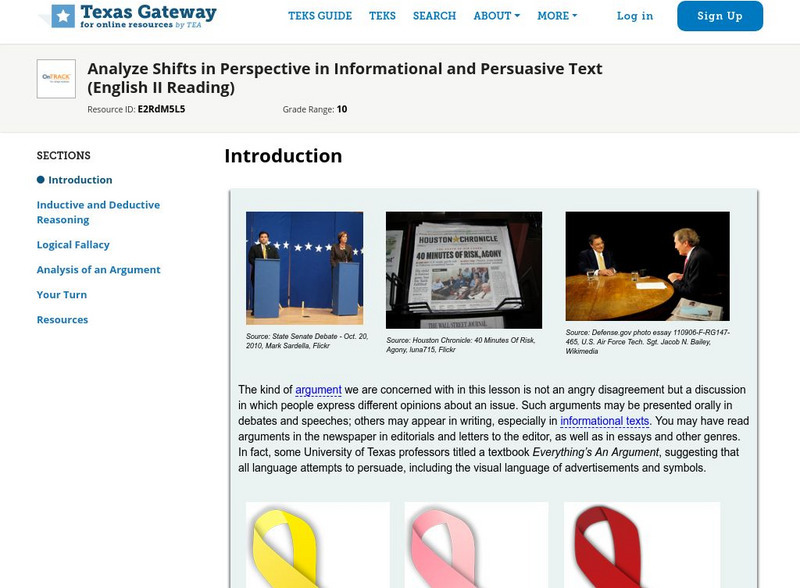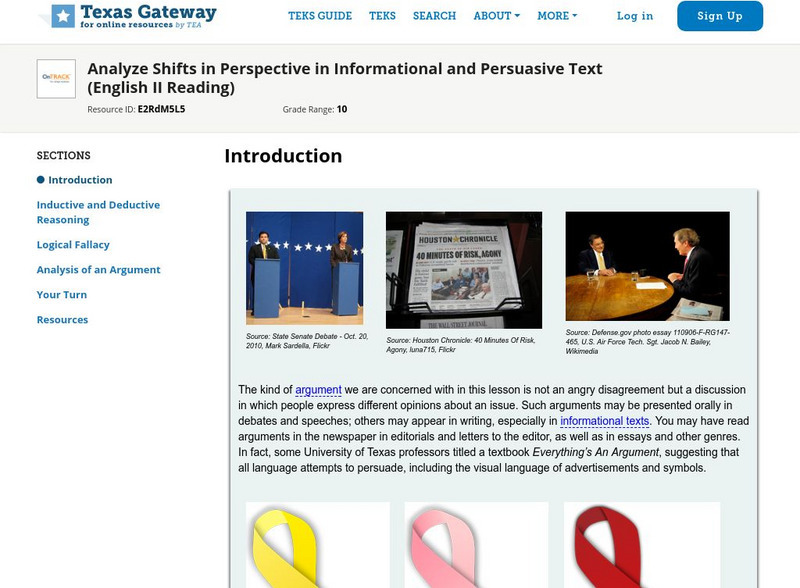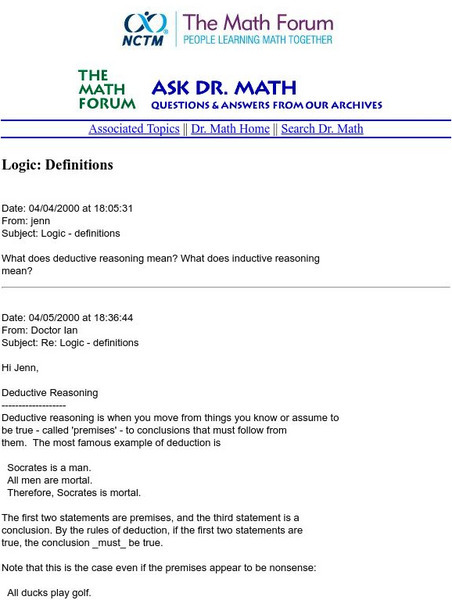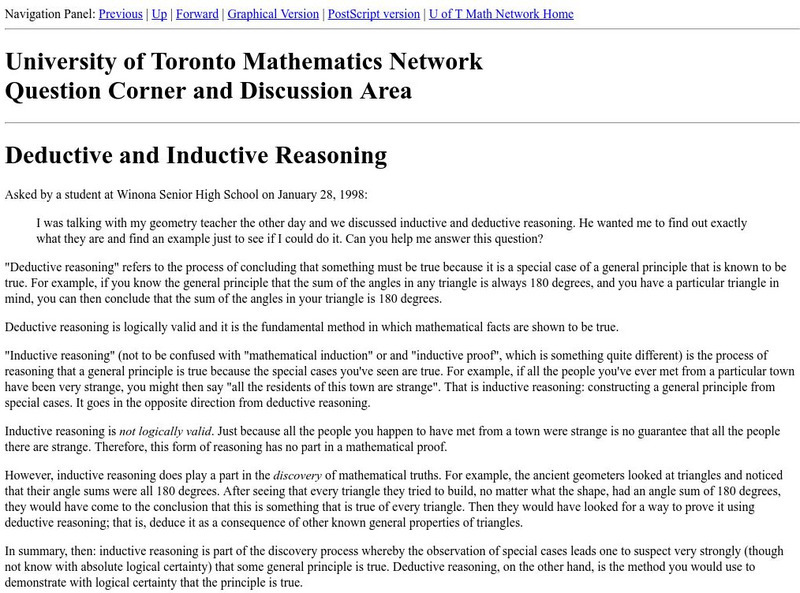Hi, what do you want to do?
Curated OER
What was Newton's Idea of Science?
Students form logical foundations for analysis of observations. They improve analytic reading abilities through practice. Students investigate the foundations of scientific thought processes and how to apply them.
Curated OER
Fundamentals of Matter
Seventh graders explore the the constituents and properties of matter. They use the scientific process while exploring solids, liquids, gases, the mass, volume and density of matter. Students plan and conduct an investigation to measure...
Curated OER
Pythagorean Theorem by Graphic Manipulation
There are many different ways to show a proof of the Pythagorean Theorem. Here is a nice hands-on paper cutting activity that shows a graphic representation. You can even challenge your young Pythagoreans to come up with their own...
Curated OER
Trigometric Ratios
This lesson requires a worksheet that is not connected. It is integral to the lesson.
Curated OER
To Give In or Not To Give In -- That Is The Question!
Seventh graders discover how to make the best decisions given the information at hand. In groups, they role-play different roles in scenerios to help them deal with peer pressure. To end the lesson, they discuss why it is so hard for...
Curated OER
An Introduction to Quadrilaterals
Learners explore different types of quadrilaterals. Students define the terminology used with quadrilaterals. They create particular quadrilaterals based on specific characteristics of the quadrilaterals using an online tool.
Curated OER
Eng 312: Final Exam
When paired with other powerpoints by Don L.F. Nilsen, this final exam covers topics addressed throughout previous lectures (slide 14 specifies which lectures should be reviewed). Teachers could use this presentation to craft their own...
Curated OER
Iterating the Function over Real Numbers
Students use a spreadsheet to find sequences of numbers. In this algebra lesson, students find the values for c of a quadratic written in standard form. They relate the behavior of the graph to the values of the equation.
Curated OER
What Would You Fly?
Learners, after reading an explanation from a NASA Web site, demonstrate an understanding of the text by writing an essay that applies the information found in the slides to a real-life question.
Texas Education Agency
Texas Gateway: Distinguishing Between Inductive and Deductive Reasoning
This lesson focuses on distinguishing between inductive and deductive reasoning. Sometimes it's difficult to separate these two types of reasoning because we often use them together; drawing conclusions in inductive reasoning is likely...
San Jose State University
San Jose St. Univ.: Inductive and Deductive Reasoning
Resource distinguishes between the two forms of argument: deductive vs. inductive reasoning by providing examples and explanations. There are also some practice exercises given to further your understanding.
Lumen Learning
Lumen: Boundless Communications: Logical Appeals
This lesson focuses on using logical appeals in persuasive speeches including inductive and deductive reasoning, inductive reasoning and associative reasoning, forming a rational appeal, and errors in reasoning-formal and informal.
University of Toronto (Canada)
Question Corner: Deductive and Inductive Reasoning
A simple discussion of the differences between inductive and deductive reasoning. Helpful to anyone who is having difficulty differentiating between the two.
PBS
Pbs Learning Media: Teaching Tips: Deductive and Inductive Reasoning (1St Grade)
Use these teaching tips from the PBS Kids Lab to help children make sense of problems and persevere in solving them, determine the unknown whole number in an addition or subtraction equations, use addition and subtraction within 20 to...
Texas Education Agency
Texas Gateway: Analyze Shifts in Perspective in Informational & Persuasive Text
[Accessible by TX Educators. Free Registration/Login Required] In this lesson, students will read informational texts and identify varying perspectives in different arguments on the same topic. You will also analyze the reasoning and the...
Texas Education Agency
Texas Gateway: Analyze Shifts in Perspective in Informational & Persuasive Text
[Accessible by TX Educators. Free Registration/Login Required] In this lesson, you will read informational texts and identify varying perspectives in different arguments on the same topic. You will also analyze the reasoning and the...
National Council of Teachers of Mathematics
The Math Forum: Ask Dr. Math: Logic Definitions: Inductive & Deductive
This site explains what deductive and inductive reasoning is. The site also explains abductive reasoning.
Web Center for Social Research Methods
Research Methods Knowledge Base: Deduction and Induction
This site provides a good explanation of deductive and inductive thinking.
University of Toronto (Canada)
University of Toronto: Deductive and Inductive Reasoning
Part of a University of Toronto website, this page defines and describes deductive and inductive reasoning in solving mathematical problems.
Science Struck
Science Struck: Examples of Deductive Reasoning
Learn what deductive reasoning is and look at examples of how to apply it.
CK-12 Foundation
Ck 12: Geometry: Types of Reasoning Study Guide
[Free Registration/Login may be required to access all resource tools.] Reasoning is a fundamental part of geometric proofs. There are several types of reasoning, many of which we innately and naturally picked up. However, the different...
University of Utah
University of Utah: History of Psychology: More on Logic
Brief overview of the definitions of 'inductive' versus 'deductive' reasoning.
Texas A&M University
Wtamu Virtual Math Lab: Beginning Algebra: Reasoning Skills
A tutorial on reasoning skills focusing on both inductive and deductive reasoning. Has several examples and exercises with answers and discussion.
Lumen Learning
Lumen: Critical Reading: Logic and Structure
This lesson focuses on structure and logic including types and purposes of essays, organizational patterns, argumentative writing, and logic and fallacies.

















